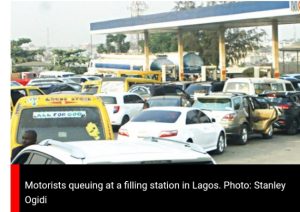Subsidy: Fuel sells N600/litre, queues worsen as filling stations shut

Less than 24 hours after President Bola Tinubu declared an end to fuel subsidy, the pump price of Premium Motor Spirit commonly known as petrol has skyrocketed to N600 per litre from N195/l in many parts of the country.
The development equally triggered a 100 per cent hike in transport fares, while long queues resurfaced at fuel stations across Lagos, Abuja, Ilorin, Benin, Asaba, Port Harcourt, Kano, Makurdi and other major cities and urban areas.
To worsen the situation, many outlets shut down their facilities and refused to dispense fuel to motorists, further creating scarcity and sparking desperation and panic buying at the fuel stations that were opened to customers.
Tinubu had in his inaugural address at the Eagle Square on Monday pronounced with finality an end to subsidy, noting that the 2023 Appropriation Act did not provide for petrol subsidy beyond June; the end of the 18-month extension period approved by the Muhammadu Buhari administration for the discontinuance of the subsidy regime.
The PUNCH reports that the petrol subsidy gulped N6.88trn under the administration of former President Buhari, according to data from the Nigerian National Petroleum Company Limited and the Nigeria Extractive Industries Transparency Initiative.
But taking advantage of the President’s Monday pronouncement, fuel outlets hiked the pump price to the consternation of citizens.
Participants who spoke during The PUNCH Twitter space session on subsidy removal on Tuesday said they bought fuel above the official price.
“I bought fuel at N600/litre at Nnewi, Anambra State today (Tuesday),” a participant who simply gave his name as Chukwuemeka, stated.
Another participant said he bought the commodity at N700/litre in Ondo State as more filling stations gear up for the eventual halt of the fuel subsidy regime.
Queues worsen
Meanwhile, queues worsened in some parts of Lagos and Ogun states as transporters hiked their fares while fuel prices went as high as N600/litre at some fuel outlets.
At the Mobil Filling Station at First Gate Bus Stop along the Lagos-Badagry Expressway, fuel wasn’t dispensed even as there was a long queue of vehicles and citizens with jerry cans. The queue extended to half of the expressway.
A commercial bus driver, Adebayo Emmanuel, who spoke to one of our correspondents at 12 noon, said he had been at the station since past 9 am and he had yet to get fuel.
The Peridot station along Festac Access Road was closed, although there were cars parked at its entrance.
The NNPC filling station located at Second Rainbow Bus Stop along Apapa-Oshodi Expressway wasn’t dispensing fuel from any of its four pumps.
Total Energies filling station at Ojota was closed, same as the Mobil station before Otedola Bridge even as Nigerians with kegs set up tents there.
Vehicles could not access the outlet due to the ongoing construction activities on that stretch of the Lagos-Ibadan Expressway.
Meanwhile, the queue for fuel at the North West fuel station, Westex Bus Stop heading toward Gbagada extended almost to Ikorodu Road.
Our correspondent observed that transport fares along the Oshodi-Apapa corridor had increased by 100 per cent, the same as the Oshodi-Ojota-Ketu route.
When one of our correspondents visited some fuel stations around the Ikotun, Igando, and Egbeda axis of Lagos, there were very long queues of motorists.
In Ogun State, one of our correspondents observed that all the filling stations between Akute and Alagbole, including Mobil, Enyo, and two NNPC outlets had been shut down.
In Nasarawa and Niger states as well as Abuja, the queues for petrol at the few filling stations that dispensed products grew worse on Tuesday, as most outlets were shut.
In Calabar, residents woke up on Tuesday to a long line of vehicles at the Dozzy, Fynfield and NNPC filling stations on the Murtala Mohammed highway.
A litre of fuel was sold for N400 with black marketers selling at N800 per litre in some parts of the city.
At the Northwest fuel station, there was a long queue as the attendants said they were awaiting directives on how much to dispense the product.
However, a litre of fuel was sold for N600 in Atimbo, while Fynefield was on Goldie Street where there were long queues in the morning.
Queues also resurfaced at fuel outlets in Ilorin, Kwara state capital on Monday evening.
Findings indicated that some fuel stations in the town opened for business from morning till 2 pm and were selling the product between N189 and N205 per litre.
As of the time of filing this report, only a few stations, including Bovas, Shirafa, and Geri Alimi were dispensing the product.
While Bovas sold fuel at N200 per litre, the Tigress fuel station in the Odota area along Ilorin/Ogbomoso road was selling PMS at N205 per litre.
Many others such as NIPCO, Total, Abanik, OANDO and the NNPC on Asa Dam road were shut.
In Asaba, the capital of Delta State, many stations were besieged by anxious motorists on Tuesday.
Katsina State Governor Mallam Dikko Radda on Tuesday night gave independent marketers operating in the state twenty four hours within which to re- open shut fuel stations and start dispensing petrol to motorists.
The governor gave the directive after he had emergency meeting with the independent marketers at Government house,katsina.
Tinubu meets Kyari
In response to the fuel crisis, Tinubu met with the Group Chief Executive Officer of the NNPCL, Mele Kyari, Central Bank of Nigeria Governor, Godwin Emefiele and others at the Presidential Villa on Tuesday.
Addressing correspondents after the parley, Kyari declared that the Federal Government could not fund subsidy again, pointing out that the government owed the company N2.8tn that it had spent on petrol subsidy.
“Today, we are waiting for them to settle up to N2.8tn of NNPC’s cash flow from the subsidy regime and we can’t continue to build this,” Kyari told State House Correspondents after meeting with the President.
Affirming the President’s stance, Kyari argued that the subsidy payment was no longer tenable as it made it difficult for the company to fund its core businesses.
He said, “Since the provision of the N6tn in 2022, and N3.7tn in 2023, we have not received any payment whatsoever from the Federation. That means they (Federal Government) are unable to pay and we’ve continued to support this subsidy from the cash flow of the NNPC.
To be Continued



